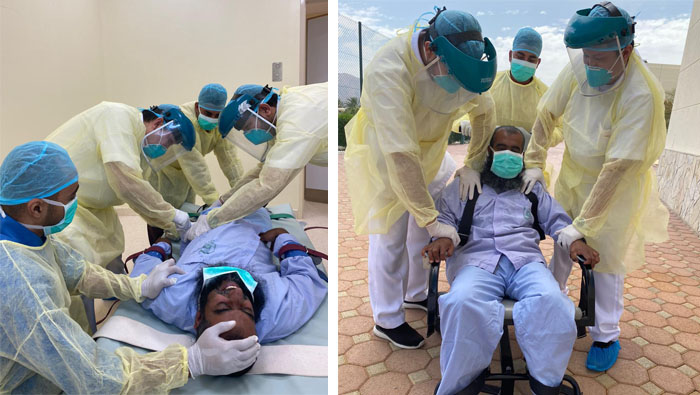
Muscat: Doctors taking care of patients infected with COVID-19 in Oman’s government and private hospitals are taking every precaution to protect themselves and others from infection, and work in shifts round-the-clock to provide necessary medical care to them.
Both public and private sector hospitals in the country follow the advice of the Ministry of Health and the World Health Organization to treat such patients.
“Initially, there was some anxiety from our doctors when it came to treating COVID-19 patients, because they were concerned about contracting infection from them and transmitting it to their family members and others,” said Dr A Basheer, a senior internist at Badr Al Sama Hospital. “However, we employed our psychiatrist to speak with all of them and encouraged them to discuss their problems, which helped calm our doctors and treat these patients as we would anyone else.
“Of course, we have to wear our PPE (personal protective equipment) before going to see the patients, and this is a practice that needs to be followed by all doctors treating them,” he added. “There is no one doctor or one team that has been set up to deal with these patients, because all the doctors are involved in some or the other capacity. If a person has breathing trouble due to COVID-19, then we will call for the cardiologist, for example. Our internists, neurologists, cardiologists, pulmonologists, everyone is involved in their treatment.”
Badr Al Sama, with the permission of the Ministry of Health, leased a building in Muttrah to isolate patients who show the symptoms of COVID-19, but have not yet contracted the disease. Patients are kept there until they show no more sings of the disease, but should they worsen, they are transferred to isolation wards that have been set up to treat infected patients.
Until last week, this facility had reached its maximum capacity of 40 patients, and was used to house those who did not have the means to conduct isolation within their own homes. All of those patients have been released after receiving a clean bill of health, and there are currently around 20 patients in the building.
“Doctors are available to take care of these patients on a 24-hour basis, so we need to take precautions even when we come home,” explained Basheer. “Otherwise, there is a chance we could pass this disease onto others, should we come into contact with patients who have it. Our clothes have to be put for wash immediately, and our shoes kept separate from the others’. We also need to take bath the moment we come home, so that we can sanitise ourselves and keep our families safe.”
At Al Masarra Hospital, doctors are faced with a more unique challenge: they take care of mentally disadvantaged patients who have contracted the disease, and as Dr Preeti Srivastav, one of the doctors who works there says, this requires an approach that is different to those followed by other hospitals.
“The difference between our hospital and the patients in any other hospital is that we have mentally challenged people here,” she explained. “Any other hospital would have patients who would follow your instructions. If, for example, you tell them to stay inside or not do something, they will listen, but our patients are very different and this is a big challenge we have.
“With regards to COVID-19, all the hospitals in the Sultanate were asked to prepare themselves, so we do have separate male and female wards, which were in accordance of and met the specifications of the Ministry of Health. We are the frontline units against such infection, so the hospital readily provided us the required protective equipment.”
Her colleague, Dr Amina Al Ghamari, oversees one of the two units set up for dealing with the novel coronavirus at Al Masarah, needs to be available throughout the day to deal with the needs of the patients, even when she is not at the hospital. It is a task she performs happily, so that those who suffer from the disease can be quickly cured of their symptoms.
“I receive calls from the hospital, even at midnight that require me to ease the tensions faced by our medical teams,” she added. “I am a mother and I have children, but I am trying to be stronger than others to be the ideal person for everyone so that we can easily overcome this period together. We’ve actually learned a lot from this pandemic, including dealing with panic-causing situations, pressure and facing challenges as one. We’ve also learned how to deal with our children during times of crises."
“We face many challenges related to mental and psychological health from our infected patients,” she revealed. “This does make our mission to care for them harder, as compared to other hospitals that are housing COVID-19 patients. Our patients unfortunately suffer from nervous agitation from time to time, and it is difficult for us to provide care to them when they are in such a state. We need to take care of them for a period of 14 days after they’ve exhibited no symptoms of the disease.